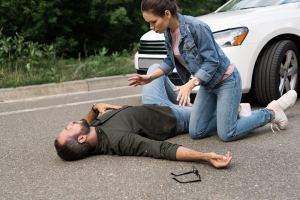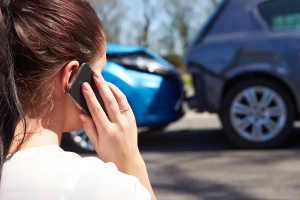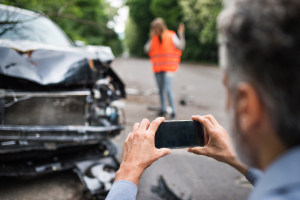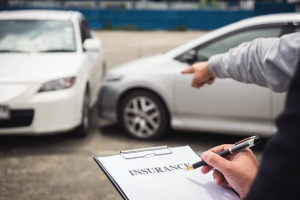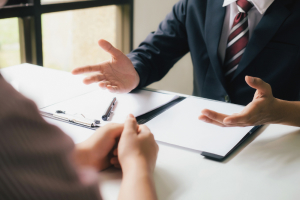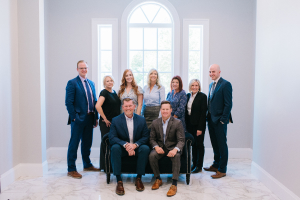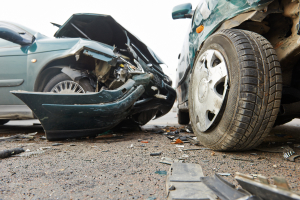
Knowing what to do after a car accident can make a difference, in many cases, in the amount of compensation that a person receives for their damages or even if they receive compensation when they file a claim against the other driver, who is the at-fault party.
What you do at the scene after the accident and what you say to a police officer or the other driver can make a difference in the compensation you receive for your damages or if you receive compensation. You need to take several steps besides contacting us as soon as possible after the car accident.
Table of Contents
Step 1: Stay Calm & Check for Injuries
It is easy for a person to panic after a car accident. Staying calm is an important step immediately after a car accident. When you stay calm, you can better gather evidence and respond to any questions from the police or other emergency services providers.
Check for injuries. You may not realize that you have visible injuries because of the panic or your concern for other people in your vehicle or other vehicles involved in the accident.
Get medical treatment even if you think you or your passengers do not have injuries. Many people will likely have serious injuries they are unaware of after car crashes.
Step 2: Call the Police To Report the Accident
Call 911 immediately after the accident. Calling the police is important to file a police report and to provide the responding police officer with details about what happened that caused the crash.
Stick to the facts, and do not add your opinion when completing the police report.
Your insurance company will want a copy of the police report when you report the accident. Ensure you get a police report number and the officer’s badge number from the officer who responds to the accident.
Step 3: Move to a Safe Area
Move to a safe area if your vehicle is blocking traffic if it is possible to move the car. Do not try to drive the car if you cannot do it. Turn your hazard lights on, turn the engine off, and wait for the police.
The police will call for a tow truck or appropriate service provider to move your vehicle if it cannot be driven from the scene or out of traffic.
Step 4: Exchange Insurance and Contact Information
Exchange insurance information and contact information with the other driver or other drivers. Do not exchange details with the other driver beyond this basic information.
Make sure that the information that you exchange with the other driver includes the following:
- Full name and contact information;
- Driver’s license numbers and license plate number;
- Insurance company information and policy number;
- Location of the accident scene; and
- Type, color, and model of vehicle.
Step 5: Gather Potential Evidence
Gather all potential evidence that you can at the scene of the accident. Note the details of other vehicles involved in the car crash. Compile information that includes each vehicle’s make, model, and year. Include a general description of the car and the license plate number. Even a partial license is helpful for the accident report and when filing a claim with your insurer.
Take pictures or video of the other vehicles while at the accident scene. Include photos of skid marks if you can get them for your evidence.
Step 6: Watch What You Say and Write Out What Happened
It is critically important that you watch what you say after being involved in a car crash. Never admit that you are the responsible party in an at-fault accident. Do not admit fault of any kind to anyone, whether to other drivers, witnesses, or when the police arrive on the scene.
Write out what happened as soon as possible after the wreck. The sooner you write out what happened, the more details you will remember. This is important when you write a statement for the police and when filing a car insurance claim with your insurance provider.
Step 7: Notify Your Car Insurance Company
You must notify your car insurance company as soon as possible after the accident occurs to start the claims process. Do not speak to the other driver’s insurance company for any reason.
Notify your insurance company if they contact you. They may try to get you to avoid filing a claim against the other drivers and to get you to accept little to no settlement. Notify your personal injury attorney if the other driver’s insurer contacts you.
Step 8: Notify the Department of Motor Vehicles
Every state has requirements regarding reporting an accident to the Department of Motor Vehicles. Check with your local Department of Motor Vehicles to determine if they need information about the crash reported to them.
Have the information about the car accident ready when you call the DMV. Some information you are likely to need includes if anyone was injured in the crash, the severity of vehicle damages, repair costs, or an estimate from the repair shop.
Step 9: Start the Claims Process
Notify your insurance company immediately after you are involved in the accident, even if you think you may be the at-fault driver.
Ensure you inform your insurance provider if the other driver is at fault. Let your insurance company and car accident attorney handle the claims process for compensation for the cost of your current medical bills, ongoing and future medical expenses, and your property damage. The property damage includes the cost of getting your vehicle repaired or losing your car.
Provide as many details as possible to your insurance company. The sooner that you contact them, the more likely you are to be able to provide the most details. Your memory of the accident may fade in the days and weeks after the crash.
How Insurance Pays Out After an Accident
The insurance claims process and the payout after a car accident depend on several factors. Which driver was at fault for the car accident and what type of insurance coverage you and the other driver have are two factors determining how insurance pays out after an accident.
If Another Driver Is at Fault
Suppose the other driver is the at-fault party, and you are not a passenger in that person’s car. In that case, the other driver’s car insurance will cover your medical bills up to their bodily injury liability coverage limit. If the accident occurs in a no-fault state, your insurance coverage covers your medical expenses.
The at-fault party’s insurance company also covers your property damages to the vehicle you were driving when the accident occurred up to their property damage liability limits.
If You’re at Fault
If you are the at-fault driver in an accident, then the payout depends on your policy. Your insurance typically covers the injured driver and any passengers. It will not cover the costs related to passengers in your own vehicle.
It will cover damages to the other driver’s car and the damages to your own vehicle if you have comprehensive collision insurance coverage.
Your medical expenses may be covered up to the limits of your medical coverage.
Our Car Accident Lawyers at Good Guys Injury Can Help You | Call Us Today!
Our car accident lawyers know state law and how it applies to car accident victims. We pursue full compensation for our clients after they are involved in a car crash with an at-fault driver.
We work to determine fault, showing that the other driver is at fault if the driver or their insurance company tries to minimize or dismiss the claim against them.
We have a proven record of obtaining fair settlements for our car accident clients and victims of other types of personal injury.
We offer a free initial consultation. Contact Good Guys Injury Law today to get started on getting compensation for your injuries. Contact us right now. We are here to help you.
